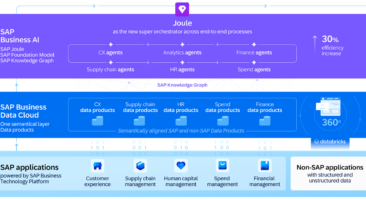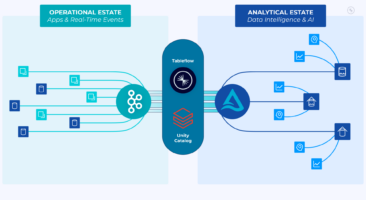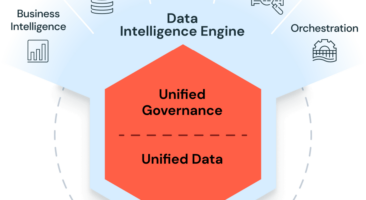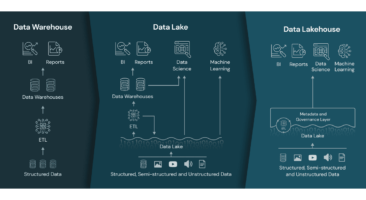The Importance of Data Management for Your Business
Implementing an effective data management strategy is crucial for IT decision-makers seeking to improve their business operations. From data warehouse and integration to process automation, data management is critical in ensuring your company’s information assets’ quality, consistency, and accuracy. This blog post explores data management, why it’s essential for your business, how to implement a successful strategy, and common mistakes, you should avoid. Finally, we’ll highlight the benefits of effective data management that can positively impact your bottom line.
What is Data Management?
Data management involves organizing, storing, protecting, and maintaining data throughout its lifecycle. Data management aims to ensure that data is accurate, accessible, and secure while also adhering to any regulatory requirements. Effective data management practices can help organizations make better decisions by providing timely access to reliable information.
Security plays a crucial role in data management as it involves protecting sensitive information from unauthorized access or misuse. Storing and using large volumes of diverse data can be challenging without proper organization and planning. Therefore, a robust system for managing your business’s critical information is essential for maximizing efficiency and minimizing risk.
Understanding the basics of data management is crucial for any organization that aims to make informed business decisions. It involves using different processes, tools, and techniques to store and manage data securely while ensuring its accuracy and accessibility. In addition, exploring the different types of data management systems, such as databases, cloud storage, or big data platforms, can help businesses choose the best option based on their requirements.
Proper data management with effective governance policies can help businesses improve productivity and minimize errors.
The role of data governance in effective data management cannot be overstated. The goal of implementing good governance policies is to ensure that all employees understand how to handle sensitive information while keeping it secure from unauthorized access or use. As a result, businesses can streamline operations while minimizing errors and improving productivity by storing critical information that meets security standards and using automation processes for routine tasks.
Why is Data Management Important for Your Business?
Effective data management is crucial to the success of any business, regardless of its size or industry. Not only does it ensure that important information is organized and easily accessible, but it also helps to maintain the security and integrity of sensitive data. By implementing strong data management practices such as regular backups and secure storage solutions, businesses can reduce the risk of theft or loss while improving efficiency.
Moreover, effective data management allows for informed decision-making by providing accurate and up-to-date information about various business operations aspects. It enables leaders to make informed decisions quickly and efficiently based on real-time insights rather than relying on guesswork or outdated information. Investing in robust data management systems can help businesses stay competitive in today’s fast-paced digital landscape while ensuring they remain compliant with relevant regulations and best practices.
Data Management also helps businesses meet compliance and regulatory requirements, often a primary goal for IT decision-makers. By using an efficient Data Management System, companies can quickly store, manage and retrieve necessary documentation while ensuring adherence to industry-specific regulations.
Leveraging big data is another essential aspect for businesses today. A well-established system makes it easier to accurately analyze vast amounts of structured or unstructured information and make informed decisions based on insights derived from this analysis.
Data Organization
Efficient storage, easy accessibility, and meaningful classification are vital for effective data organization. Without proper management, businesses risk losing valuable insights and wasting resources on inefficient processes. Here are some tips to help organize your data effectively:
- Utilize cloud-based storage solutions for efficient and scalable storage.
- Implement a straightforward naming convention for files and folders to ensure easy accessibility.
- Categorize data into meaningful groups based on subject matter or business function.
By implementing a structured approach to data organization, businesses can improve their overall efficiency while unlocking valuable insights from their data.
Data Security
Protecting your company’s sensitive information from cyberattacks and data breaches is crucial to maintaining customer trust and avoiding costly legal consequences. Compliance with regulations such as GDPR, CCPA, and other data protection laws is also essential. In addition, proper authentication and authorization measures for access control must be implemented to prevent unauthorized users from accessing critical data.
Effective data security measures include:
- Regular backups of essential data
- Use of encryption technology
- Network segmentation
- Controlling employee access to sensitive information through user permissions
- Monitoring network activity for suspicious behavior
Maintaining strong security practices will help safeguard your business against potential threats while ensuring compliance with applicable regulations. In addition, implementing appropriate authentication mechanisms can further enhance your systems’ overall level of protection.
Improved Decision Making
Accurate insights are critical for making the right decisions in business. With clean and reliable data, decision-making becomes more efficient and effective. Streamlining processes further speeds up decision-making, allowing companies to stay ahead of their competitors. In addition, advanced analytics can provide a better understanding of customer behavior, increasing the accuracy of insights even further.
Here are some key benefits that improved decision-making through data management can bring to your business:
- Increased accuracy of insights through clean and reliable data
- Streamlined processes for faster decision-making
- A better understanding of customer behavior through advanced analytics
By investing in data management systems such as data warehousing, integration tools, and process automation solutions, IT decision-makers can help their organizations leverage these benefits while reducing errors caused by poor-quality or unreliable information.
How to Implement an Effective Data Management Strategy
To implement an effective data management strategy, assess your data needs. Identify what data types are critical to your business and prioritize them accordingly. It will help ensure you invest in the right tools and processes to manage your data effectively.
Once you have identified your data needs, choose a comprehensive data management system to handle all aspects of your organization’s information lifecycle. Ensure that the system integrates with other systems within the organization for seamless operations.
Finally, train your team on best practices for managing and securing sensitive information using the chosen system. A well-trained team is essential for ensuring compliance with industry regulations and protecting against potential cybersecurity threats.
Assess Your Data Needs
Identifying your data needs is crucial to implementing an effective data management strategy. Here are some key points to consider when assessing your data requirements:
- Identify the types of data your business generates: Understanding your organization’s different types of data can help you determine how much storage space and processing power you’ll need.
- Determine how much data you need to store and analyze: Analyzing large quantities of unstructured or semi-structured information may require more sophisticated tools than traditional database systems.
- Evaluate the quality and accuracy of existing data: Before investing in new hardware, software, or services, it’s essential to ensure that the existing datasets are accurate, reliable, and up-to-date.
Carefully considering these factors before selecting a specific solution for managing company information will go a long way toward ensuring project success.
Choose a Data Management System
Choosing the right data management system is essential for any business seeking to maximize efficiency and improve decision-making. When evaluating different data management systems, it’s important to consider scalability and flexibility. The data management system should be able to adapt as your business grows and changes over time. Look for features like automation, integration, and security that can streamline operations while providing robust protection against potential threats.
Another critical factor in selecting a data management system is researching vendor reputation and customer reviews. It will give you an idea of how well the product performs in real-world scenarios, particularly within your industry or niche market. By carefully considering these factors when choosing a data management solution, you can make sure that your investment pays off with improved productivity, better insights into customer behavior patterns, and enhanced security protocols – all leading toward great success for your business overall.
Train Your Team
Provide your team members with the tools and knowledge they need to succeed by investing in proper training. When it comes to data management, this is especially crucial for ensuring accurate and efficient processes. Here are some key areas to focus on when training your team:
- Provide comprehensive guidance on how to use the chosen system effectively
- Ensure all team members understand best practices for managing data
- Encourage ongoing learning opportunities for continued improvement
Investing in training will benefit your primary operations and increase long-term productivity and revenue growth potential. Everyone involved with data management must understand their role in maintaining accuracy, security, and efficiency throughout the entire process.
Common Data Management Mistakes to Avoid
Effective data management is crucial for businesses of all sizes. However, there are some common mistakes that companies make, which can lead to severe consequences down the road. One such error is not having a clear data management plan in place. Without a defined strategy, data can become disorganized and difficult to manage, leading to delays and errors in decision-making processes.
Another frequent error businesses make is failing to back up their data regularly. This practice leaves them exposed to potential losses if something goes wrong with their primary storage system or hardware failure occurs. Finally, neglecting data security is another critical mistake businesses often make regarding effective data management practices. Failing to establish reliable security protocols can result in unauthorized access or theft of sensitive information, damaging customer trust and business reputation. Avoiding these common pitfalls through proper planning, backup procedures, and increased focus on cybersecurity measures will help ensure smooth operations for your organization over the long term while protecting valuable company assets simultaneously!
Not Having a Clear Data Management Plan
Data management is a critical aspect of any business that deals with data. One common problem businesses face today is the lack of understanding of the data lifecycle, which leads to inadequate planning and execution. It can result in inefficiencies, increased costs, and loss of valuable insights.
Another challenge is the failure to identify and prioritize data usage. Businesses need to understand what data they have and how it can be used to drive their operations forward. Without this knowledge, they risk collecting unnecessary or irrelevant information that will only add more complexity to their systems.
In addition, many businesses struggle with establishing clear roles and responsibilities for managing data effectively. Data should be treated as a strategic asset that requires careful attention from all stakeholders involved in its creation, storage, maintenance, retrieval, and utilization. A well-defined plan must outline who has access to specific information at different stages of its lifecycle so that everyone knows what’s expected from them.
To overcome these challenges efficiently, IT decision-makers seeking data warehouse, data integration, and process automation solutions must create a comprehensive plan for managing organizational resources properly. It includes implementing proper backup procedures, data security measures, and strict access controls. In doing so, you’ll ensure your organization remains competitive, having access to accurate, reliable, and meaningful insights that lead you toward growth opportunities over time while mitigating potential risks associated with poor management practices. Forward-thinking organizations can take advantage of such analytical tools and are likely already seeing benefits across various aspects, such as faster reporting, making sound decisions, and predicting trends without undue stress on staff, among other things.
Failing to Back Up Data Regularly
Underestimating the frequency of backup needed can have significant consequences, as data loss is not a question of ‘if’ but ‘when.’ Therefore, IT decision-makers should ensure that backups occur frequently enough to ensure minimal data loss in case of an unexpected event. They should also consider the amount and type of data being backed up.
Not having a disaster recovery plan in place can be disastrous for businesses. A straightforward program provides instructions on retrieving lost or damaged information and getting systems back online quickly. In addition, companies need to test their disaster recovery plans regularly and update them as required.
A critical mistake is assuming that cloud storage is always safe from data loss. Data may still be lost if it is not adequately protected with backups or other security measures, such as encryption, multi-factor authentication, access controls, and monitoring. Therefore, IT decision-makers must work closely with cloud providers to understand their service level agreements (SLAs) regarding backup, restoration times during outage events, redundancy protocols, etc., so they have all the necessary information when making decisions about storing sensitive information in the cloud.
Neglecting Data Security
Properly securing sensitive information is crucial for any business. Neglecting to implement proper access controls for sensitive information can lead to a breach of security, resulting in compromised data and potential harm to customers. Additionally, overlooking vulnerabilities due to outdated software or hardware systems leaves businesses vulnerable to attacks by cybercriminals seeking valuable data.
Ignoring regulatory compliance requirements when handling customers’ personal information is another way that neglecting data security can put your business at risk. Failure to comply with regulations such as GDPR or HIPAA could result in costly legal penalties and negatively impact your company’s reputation.
In conclusion, neglecting data security is not an option for businesses operating in today’s technology-driven world. By implementing strict access controls, keeping systems up-to-date, and adhering to industry regulations regarding handling sensitive information, companies can protect their valuable assets while building trust with their customers.
Benefits of Effective Data Management for Your Business
Effective data management is crucial for any business’s success, as it can significantly improve operational efficiency. By organizing and analyzing data, companies can identify areas of inefficiency or waste in their processes and make informed decisions to streamline operations. It leads to significant cost savings, increased productivity, and ultimately higher profitability.
In addition to improved operational efficiency, effective data management enables better customer service. Businesses can personalize their approach toward customers by accessing accurate customer information from various sources, such as sales history and social media interactions. As a result, it improves the overall experience for customers and helps businesses build stronger relationships with them, resulting in repeat business and referrals.
Improved Operational Efficiency
Streamlining data integration processes can significantly improve operational efficiency. Businesses can eliminate manual errors and save time by automating data management tasks. It not only improves the accuracy of the data but also frees up resources for other critical business functions.
Real-time access to critical business information is essential in today’s fast-paced environment. With a centralized repository for all relevant data, decision-makers can quickly analyze performance metrics and make informed decisions. This increased visibility into organizational performance enables companies to respond faster to changing market conditions and customer demands, ultimately leading to improved operational efficiency.
Better Customer Service
Personalized customer experience is critical to building solid relationships with customers. With data analytics, businesses can gain insights into individual preferences and tailor their services accordingly. It allows for a more personalized experience, increasing customer satisfaction and loyalty.
Faster response times to customer inquiries and issues are essential in today’s fast-paced business environment. Data management gives businesses real-time access to customer information, allowing them to respond quickly and effectively. This results in improved customer experiences and higher levels of trust.
Accurate insights into customer needs and preferences are crucial for any company looking to stay ahead of the competition. By leveraging data management tools, businesses can better understand what their customers want, which products/services they prefer, and how much they’re willing to pay – ultimately leading to better-informed decisions that drive growth and revenue.
Competitive Advantage
Data-driven decision-making is essential for strategic planning, enabling your business to identify previously overlooked opportunities. By analyzing data, you can gain insights into customer behavior and market trends, allowing you to pivot quickly and make informed decisions based on accurate forecasting.
Efficient resource allocation is another critical benefit of proper data management. With the ability to analyze historical data and predict future trends, you can allocate resources more effectively and reduce waste. It enables your business to operate at a higher level of efficiency than competitors who rely on guesswork rather than complex data analysis.
Conclusion
Effective data management is crucial for any business looking to succeed in today’s digital age. By implementing efficient data management strategies, companies can experience various benefits, including increased efficiency, better decision-making capabilities, and improved customer satisfaction.
Conversely, poor data management can lead to many challenges, such as inaccurate reporting and analysis, regulatory non-compliance, and reputational damage. Therefore, organizations must recognize the importance of effective data governance to avoid these pitfalls.
Looking toward future trends in data management, we expect to see an increase in automation tools that utilize machine learning algorithms for predictive analytics and decision-making. Additionally, there will be a greater focus on privacy regulations such as GDPR compliance, requiring organizations to pay closer attention than ever before when managing their sensitive information.


















